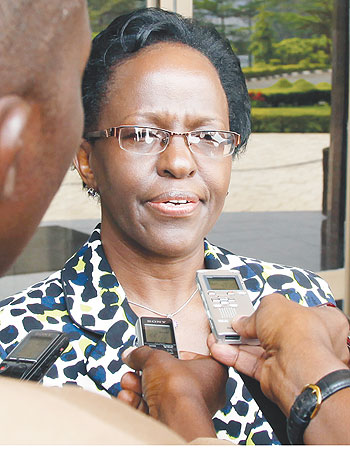The outgoing Executive Secretary of the International Conference on the Great Lakes Region (ICGLR), Tanzania’s Ambassador Liberata Mulamula, completed her tenure as head of the regional body last December. She recently told The New Times’ GASHEGU MURAMIRA what her ups and downs were in the five years she was at the helm of the 11 member organisation. Below are the excerpts;


The outgoing Executive Secretary of the International Conference on the Great Lakes Region (ICGLR), Tanzania’s Ambassador Liberata Mulamula, completed her tenure as head of the regional body last December. She recently told The New Times’ GASHEGU MURAMIRA what her ups and downs were in the five years she was at the helm of the 11 member organisation. Below are the excerpts;
TNT: How would you describe your experience at the helm of ICGLR?
LM: It was a very challenging journey but, at the end, I should say it was a rewarding one. You know when this process started – of the Great Lakes initiative – the region was in turmoil. It was a region at war but, more importantly, there were still big rebellions, especially in Burundi and eastern DRC.
I have now seen the end of those rebellions and what we now have as a future is to see how best we can tackle the remaining armed groups.
During the ICGLR Heads of State summit, we received a report from the Ministers of Defence and intelligence officials, and I should tell you that this had never happened before.
It was the first time that we were having these officials in this framework deciding on what should be done. This gives me hope because one of the major areas was repatriation and disarmament to deal with the negative offices.
It’s because of this that I’m now happy that I’m leaving when the region is the most peaceful on the continent. It is now united to deal with all these security problems, there has now been consensus building and during my tenure, all countries have undergone successful elections.
TNT: There have always been reports of limited financial contributions from member states to run ICGLR affairs, hasn’t this impeded success on the part of the organisation?
LM: You know there are decisions reached upon in Heads of State summits that need support for implementation, both financial and human resources. When the secretariat was established, it was supposed to have few people to follow up on issues.
But this hasn’t been the case; it has been more of following up, it has been very challenging on my part with a small skeleton staff to be able to cope with the so many needs and expectations.
The other challenge was ownership, because whatever decision taken by the member states, it has always been the secretariat to follow up. I hope as I leave, this will improve; that member states will express more commitment to implement what they decide.
TNT: Has there been political will to drive these decisions at national level?
LM: I must say that, with time, we have seen political will, but then it depends on the issues. Some issues attract interest and strong political will but, generally, I have seen that the will was there. When leaders agree to meet, this demonstrates that there is political will. But whether this is translated into implementation and action-oriented, it becomes another thing.
This is because sometimes, at regional level, you have someone but when you go to the national level, there are other priorities and these ones are forgotten.
My challenge has been to keep knocking on the doors of the leaders in member states and telling them; look you decided on this and, therefore, please put it into implementation. So, my cry has been implementation.
TNT: Every time ICGLR holds meetings, the issue of negative forces keeps coming up. Are you leaving office satisfied that negative forces have been neutralised?
LM: At the Heads of State summit, Rwanda made a very important observation calling for action on negative forces that are still threatening peace in the region. I’m happy that the problem of FDLR is no longer seen as a Rwandan problem but a regional one now.
For instance, there was a group of armed forces threatening to cross to Tanzania through Lake Tanganyika, but because of this cooperation and the good relations existing amongst intelligence organs, Tanzania was tipped that the rebel groups are now on their way to Kigoma. The moment they arrived, they were intercepted there. In the past, all this wasn’t possible.
I must say that while we still have the FDLR problem, a lot has been done and we shouldn’t be complacent because the problem is still there. But this spirit of seeing that one problem is not for a particular country is what should be promoted in concrete action.
TNT: As Professor Ntumba (Congolese national) takes over from you, what would you attribute to the success ICGLR has registered so far?
LM: Much as there has been support from other member states, I must say this initiative wouldn’t have reached where it is if it was not for Rwanda. Rwanda took this initiative very seriously and the leadership has been very committed.
Ends


